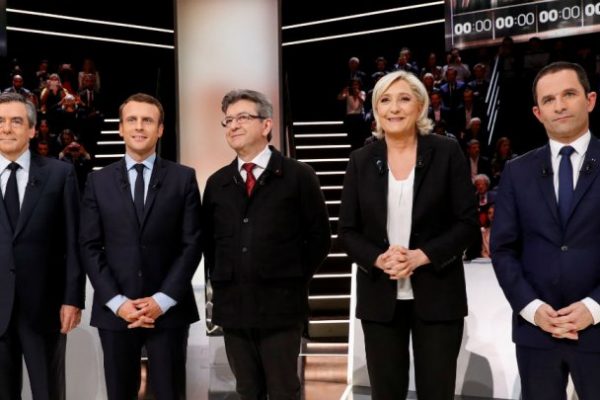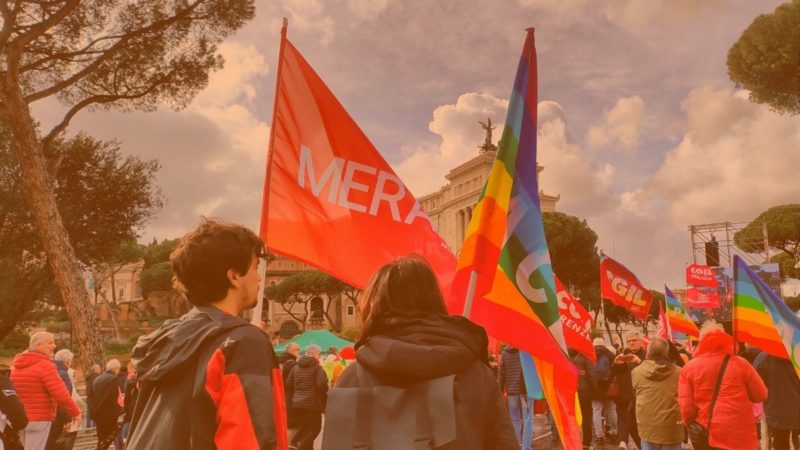In keeping with the principle of DiEM as a pan-European movement, all members of all nationalities were allowed to vote. After all, like the German election, the French election will affect the rest of Europe as much as it will affect France.
And remarkably, members chose not to rally behind one candidate but to support an alliance of forces against fascism and/or neoliberalism.
By Alex Sakalis (originally published in openDemocracy)
We all know that democracy is in a bad state in the EU. Since the Greek tragedy of 2015, when the veil was lifted from the internal engine of the European Union, it is clear that democracy is no longer being preached let alone practiced. But at the same time, new democratic processes are being invented. One example of this is DiEM25 – a pan-European and democratic movement, as it debates the upcoming French elections.
French DiEM members began the debate among themselves, at their local DSCs (democratic spontaneous collectives) and on the DiEM forum. So that non-Francophones could follow and participate in the debate, there was also an English language thread, where French members summarised what was being discussed and engaged with other members across Europe.
The result was a briefing written by the members of DiEM25 France and endorsed by DiEM’s Coordinating Collective, summarising each of the main candidates’ policies vis-à-vis the economy, the environment and European solidarity.
The document gives a brief assessment of each candidate’s strengths and weaknesses viewed from the perspective of DiEM25’s New Deal For Europe. It is a background breifing and a discussion opener designed to act as the basis of internal deliberation on DiEM25’s official stance with respect to Round 1 of the French presidential elections. The briefing also poses some interesting questions. Who has the better policies on the environment? Who can best heal a tense society still labouring under a ‘state of emergency’? And what happened to the early promise of Benoit Hamon?
Here is the briefing:
DiEM25’s stance in the 2017 French Presidential and Legislative Elections
This text, written by members of DiEM25 France and endorsed by the Coordinating Collective, is intended as a background briefing to act as the basis of DiEM25’s internal deliberation on DiEM25’s official stance vis-à-vis the French Presidential Election (Round 1 in particular)
The French political system (the Fifth Republic) concentrates a great deal of power in the hands of one person (the President), thus subordinating Parliament to executive power. This conflicts with the democratic principles advocated by DIEM25. The fact that the legislative elections follow the presidential ones by one month only tends to favour the candidates supporting the President elect.
Additionally, the electoral system (two-rounds, first-past-the-post, no proportional representation) favours the established large parties to the detriment of smaller or younger parties. Indeed, in response to this situation, two candidates – Benoît Hamon and Jean-Luc Mélenchon – include in their programs the establishment of a Sixth Republic, that is to say a complete and radical reform of the French political system.
Presidential elections
The first round of the 2017 presidential election will see 11 candidates amongst which 5 have or could have a possible claim to victory:
François Fillon (Les Républicains – LR, conservative right)
Marine Le Pen (Front National – FN, extreme-right)
Emmanuel Macron (En Marche – EM, centre-right and centre-left)
Benoît Hamon (Parti Socialiste – PS, left, allied with the green party, Europe-Ecologie Les Verts – EELV)
Jean-Luc Mélenchon (France Insoumise – FI, radical left).
There is no need to detail here the position of Marine Le Pen, who believes France should leave the European Union and the Euro (Frexit), nor the position of François Fillon who is aligned with Angela Merkel on European issues, and who, on economic and social matters, proposes devastating austerity policies.
It is nonetheless important to note that Marine Le Pen is almost assured a place in the second round of the election. The same polls show that she would lose to any candidate opposing her in the second round, giving her opponent the practical guarantee of becoming the French Republic’s new President.
DiEM25, therefore, is confined to assessing the relative merits of three candidates: Benoît Hamon, Emmanuel Macron, and Jean-Luc Melenchon.
Benoît Hamon
On European economic recovery, Benoît Hamon is proposing a program based on green investments and an ecological transition, mutualisation of public debt and its purchase by the European Central Bank, social cohesion and a European minimum wage, welcoming policies for refugees, fiscal harmonisation and a European budget, as well as the suspension of CETA.
Comment: While these policies resemble DiEM25’s they, unfortunately, lack the sophistication of their counterparts in DiEM25’s European New Deal.
For instance, there is no direct link between the ECB’s quantitative easing project and an EIB-led and managed pan-European investment program – no limited debt conversion plan that can be applied to all Eurozone public debt without Treaty change or changing the ECB’s charter – a reaffirmation of the 3% Maastricht deficit limit that contradicts Hamon’s pronouncement for a Universal Basic Income (which, by the way, differs substantially from DiEM25’s Universal Basic Dividend proposal – see below). The result is a policy agend characterised by naiveté and that is, therefore, open to legitimate criticism by Hamon’s opponents.
On democratisation at a pan-European level, Benoît Hamon has adopted the Piketty Group’s proposal for the creation of a Euro Chamber, comprising parliamentarians from national parliaments. This contradicts DiEM25’s proposal to embark on a Constitutional Assembly process rather than creating a fig leaf of parliamentarianism by which to cover up the lack of democratic legitimacy.
Comment: The Euro Chamber proposal is a ‘deal-breaker’ for DiEM25 because it demonstrates Hamon’s tendency toward a faux federalism that, in the end, does not differ substantially to the Macron-Schäuble basic plan.
On social issues, Hamon plans to suppress the El Khomri law and to progressively put in place a Universal Basic Income, conditions of which have evolved throughout the campaign. He is also favourable to a common European Defence plan and to a European energy policy. The method he proposes to attain his goals is one of gradual renegotiations of treaties, without specifying exactly how.
Comment: The Universal Basic Income proposal has given Hamon much ‘air’ space. But it is fundamentally flawed. DiEM25 has explained (as part of our European New Deal) that, while a rolling out a universal basic payment is crucial, it cannot and should not be funded by taxes.
If it is (as Hamon’s program implies), it will either lead to a blowout of government expenditure or it will cannibilise the existing welfare state. It is for this reason that our European New Deal has put a great deal of thought in ways of funding a Universal Basic Dividend not from taxation but from creating a European Equity Depository that will own property rights to returns from capital and IP rights. Hamon’s proposal is, in this sense, primitive and damages a good idea’s long-term prospects.
Summary: Benoît Hamon’s program comes closest to DiEM25’s European New Deal. Alas, it does not come close enough. The Hamon program’s policies that are similar to DiEM25’s are far cruder than those in the European New Deal and, therefore, open to legitimate attacks from the Right. As for the rest, that pertain to Europe’s democratic future, they are too close to Macron’s and impossible to defend from the Left. For this reason DiEM25 would have difficulty supporting Benoît Hamon’s in the first round.
Emmanuel Macron
On Europe, Emmanuel Macron holds a pro-European position that, on some points, seems to concur with some of DIEM25’s positions, for example: pan-European democratic conventions, refugees and a policy of favouring federal solutions But, his readiness to acquiesce to generalised austerity in exchange for a macro- economically insignificant Eurozone-wide budget constitutes an effective capitulation to Wolfgang Schäuble’s Plan for Europe.
More worryingly, Macron is clearly aligned with the CDU’s fixation with neoliberal labour market reforms in the spirit of the German Hartz-Schröeder’s reforms as well as cuts in state aid for local authorities.
The Macron and El-Khomri laws from the present government, that he inspired, give an idea of his future policies, as do his recent pronouncements in favour of reducing the current wealth taxes without committing to an increase in inheritance taxes. We also note that Macron is favourable to CETA.
Summary: Given Macron’s insupportable position on Europe and neoliberal domestic program, DiEM25 cannot support his candidacy in the first round of the Presidential elections.
Jean-Luc Mélenchon
Jean-Luc Mélenchon’s program includes many measures close to Benoit Hamon’s, particularly regarding the European Central Bank, public debt purchase, economic revival, energy and ecological transition, and social convergence.
Mélenchon opposes Hamon on the Maastricht deficit rule, on defence and on the universal basic income. He stands for strict political supervision of the ECB, control of finance, ending privatisation of public services and a “united and ecological protectionism”.
Regarding European matters Jean-Luc Mélenchon has a two-pronged strategy:
⁃ Plan A starts with the unilateral cessation of application of fiscal treaties and of regressive social directives, and capital control. He then proposes to renegotiate those treaties and directives leveraging the threat of exiting them.
⁃ Plan B, in case of a failure of Plan A negotiations, states an exit from the single currency after referendum, a new common currency for “willing countries” and the setting up of a “cooperation with other peoples of Europe”.
Summary: Melenchon’s proposals would have had DiEM25’s complete support in… 1983. His vision of the fiscal and monetary ‘rules’ would have been far preferable to those that prevailed in the end, beginning with Maastricht.
However, DiEM25 believes strongly that, in 2017, Plans A&B above are inappropriate. Any attempt to implement them will lead to the creation of a deep fault line separating the surplus from the deficit countries, along the river Rhine and across the Alps, with the result of a massively accelerated crisis of extreme deflation in the North East and stagflation everywhere else.
Perhaps this is unavoidable and will happen even without Jean-Luc Melenchon’s election (as a result of the terrible effects of the Establishment’s current policies). But to make these terrible developments the Left’s own plan is a major miscalculation that, in the end, only benefits Marine Le Pen. This is why DiEM25 cannot support Jean-Luc Melenchon’s candidacy.
Legislative elections
Given that it is likely – in the absence of a coalition between Benoît Hamon and Jean-Luc Mélenchon – that the elected candidate will not come from one of the main parties (PS, LR), there will be a question of whether the next president will have a majority in the National Assembly (Parliament). In the – likely – event of the election of Emmanuel Macron, he will have to govern with either a right wing majority, or with no stable majority at all, but with strong LR and PS groups, and a substantial FN group.
Besides, there is a likeliness that the Socialist Party (PS) would implode after the presidential election, especially if Emmanuel Macron is elected. This could allow the establishment of political coalitions during the legislative elections: Hamon’s left, together with Mélenchon’s left could seize the opportunity to reinforce the weight of a progressive and social left in the National Assembly.
DiEM25 France’s position
DiEM25 would like to support a single candidate before the first round. As a political movement we feel the need and the duty to offer clear guidance to French voters seeking our advice. Some of us worry that if DIEM25 does not adopt a clear position at such a significant political moment, it runs the risk of becoming irrelevant in the French political context. However, the political situation in France today raises serious questions about the defensibility of supporting one of the above three candidates.
The centre left has clearly imploded, following five years of President Hollande’s government. Benoît Hamon has valiantly tried to salvage the Socialist Party from the Hollande wreck age but has adopted policies that, even if well intended, lack credibility. In addition, many DiEM25ers in France do not trust the Socialist Party and are afraid that Benoît Hamon may ‘Hollandise’ himself after the election or, more likely, fail to transform the culture of the PS.
Jean-Luc Mélenchon’s Left Party has also failed to rise up to the occasion. His program cannot be implemented on the day after the election in a manner that stabilizes the French and European economic crisis so as to allow for a new progressive, internationalism against the forces both of the establishment and the Nationalist International. Moreover, his pronouncements diverge from those of his close entourage: for some his plan B is solely a leverage to negotiate plan A seriously. Others however see Plan B as their Plan A, rendering them allies (even if unwillingly) of Le Pen.
As for Macron, he ruled himself out by his decision to seek the anointment of both Angela Merkel and of the parts of the French bourgeoisie that demand lower taxes for themselves.
Ideally, DiEM25 would want to see a single candidate represent progressive internationalism in France’s Presidential Election – it would be the only way to ensure the crushing defeat of both Le Pen and the neoliberal establishment, perhaps from the 1st Round. The failure to build such an alliance is an opportunity for DIEM25 France to think, unite and act politically on the European question.
CONCLUSION: DiEM25’s POSITION – a proposal
DiEM25 will, as always, decide on its stance collectively and democratically by means of an internal ballot that will involve four options:
Option A – DiEM25 calls upon French progressives to: (1) Vote in the 1stRound of the Presidential Election for any candidate other than Le Pen or Fillon, (2) Campaign for a single progressive internationalist list of parliamentary candidates in the legislative elections.
Option B – Vote for Benoît Hamon in the 1st Round of the Presidential Election
Option C – Vote for Emmanuel Macron in the 1st Round of the Presidential Election
Option D – Vote for Jean-Luc Mélenchon in the 1st Round of the Presidential Election
PLEASE NOTE: Two discussion threads are available on the Forum to discuss what DIEM25’s position should be regarding the French presidential and legislative elections: One is in French. The other in English.
And here were the results:
A (59.48%)
B (13.62%)
C (8.08%)
D (18.83%)
In keeping with the principle of DiEM as a pan-European movement, all members of all nationalities were allowed to vote. After all, like the German election, the French election will affect the rest of Europe as much as it will affect France.
And remarkably, members chose not to rally behind one candidate but to support an alliance of forces against fascism and/or neoliberalism.
As well as French Presidential debates, DiEM25 members had previously engaged in democratic discussions to arrive at their positions for the Brexit referendum (and its aftermath), as well as the Italian constitutional referendum.
Volete essere informati delle azioni di DiEM25? Registratevi qui!




